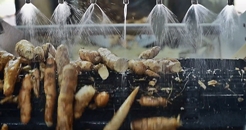 Producing energy from waste water
Producing energy from waste water
From an article in Pioneers Post
The journey from farm to fork can be highly polluting, with food processing firms a major source of harmful methane emissions. How do you get these companies to take action? In Indonesia, B Corp Gree Energy has found a solution – one that also offers stable, renewable power to rural homes.
Dealing with waste in a way that not only reduces its negative environmental impact, but also transforms it into energy is not a new phenomenon – the technology has been gradually implemented across the world over the last 30 years, with particular success in Europe, and in some other countries such as Thailand. But introducing it in many poorer countries comes with other challenges.
Nicolas Stirer, a French-born engineer, moved to southeast Asia in 2008 to work for a biogas company. He worked in renewable energy and wastewater treatment, becoming familiar with some of the sustainability issues specific to emerging countries – as well as some of the solutions. In 2014, he founded Gree Energy.
He wanted his new business to focus on global food systems – a major contributor to climate change. A particular culprit is wastewater: when wastewater is sent to open areas like lagoons or ponds, it mixes with organic matter, generating methane, which escapes into the atmosphere. This is often the case in places with minimal regulation.
In Indonesia alone, food processors’ wastewater creates more pollution than the domestic wastewater of the entire country’s population. That wastewater pollution emits greenhouse gases that are equivalent to the greenhouse gas emissions of 10m cars.
The solution is to install an anaerobic wastewater treatment plant, so that methane is still produced, but captured and turned into biogas (a mixture of mainly methane and CO2) – renewable energy that can be sold as electricity or thermal energy, or compressed to make fuel. This can reduce a food processor’s overall greenhouse gas emissions by up to 90% and its water pollution by up to 99%. But, while there is huge potential commercial value in this process, it can be costly to install. And, in many countries of the global South, there is little or no environmental regulation pushing them to do so.
So Gree Energy has had to offer additional solutions. It partners with food processors, helps them understand the biogas potential that they could generate, and works with them to create a project that is financially viable – by helping the business to get set up to sell carbon credits, develop and sell clean energy (to either manufacturing industries or the national grid), or raise project finance.
Gree is only just starting and its sole ongoing project is a proof-of-concept with a cassava mill in Hamparan, Lampung, which employs almost 100 workers and buys produce from around 4,000 cassava farmers. Thanks to Gree, the mill now supplies 9.8 GWh of electricity to the local grid per year – enough to supply 20,000 people with clean and reliable energy, while reducing greenhouse gas emissions by some 30,000 tonnes of CO2 annually. 5 other projects are now in the pipeline.
Millions of households in Indonesia experience electricity shortages, unpredictable power outages or unstable connections. In most rural areas, the power is “very intermittent”, with blackouts or multiple voltage drops. But also, Indonesia has an untapped biogas-to-energy potential of 40 TWh - enough to supply 30m people with clean and reliable energy in rural areas.
Despite the obvious benefits of clean reliable energy, lower levels of pollution and decarbonising the food supply chain, obstacles so far have been; acceptance of a new idea, financial viability, fear of increased costs for food processors making them less competitive (even though they know they need to do something about the waste), regulative hurdles, and the willingness of energy companies to purchase the electricity due to cost compared with coal-fired plants. These hurdles have reduced over time as food processors, financiers, regulators, energy companies, etc., come to terms with climate change.
There are plans to expand into other countries of the global South. Gree Energy offers an easily replicable model for other agriculture-based economies – whether in central America, east Africa, or southeast Asia – countries with low regulatory pressure, high-polluting agribusinesses and a need for affordable, renewable energy in rural areas.
Read the full article here.
Retweet about this article:
From an article in Pioneers Post, 21/06/2023